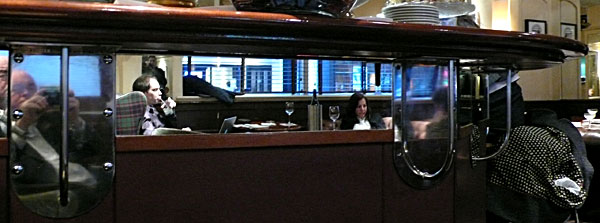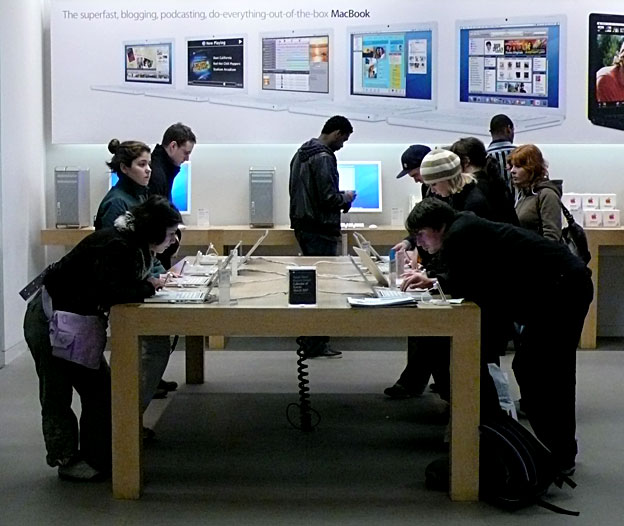John Backus, the creator of FORTRAN, the first high-level programming language, has died at the age of 82. He led the small team at IBM which produced the compiler and in the process enabled engineers and mathematicians to harness computer power without having to wrestle with machine code. Fortran (the name was an amalgam of ‘formula’ and ‘translation’) was released in 1957. It was the first programming language I learned as an undergraduate (working on an IBM 1401 mainframe). Nice Herald Trib obit here.
Only approved MySpace invaders allowed in FoxSpace
Well, well. The NYT is reporting that you can put what you like on MySpace — so long as it isn’t designed to bring you revenue.
Some users of MySpace feel as if their space is being invaded.
MySpace, the Web’s largest social network, has gradually been imposing limits on the software tools that users can embed in their pages, like music and video players that also deliver advertising or enable transactions.
At stake is the ability of MySpace, which is owned by the News Corporation, to ensure that it alone can commercially capitalize on its 90 million visitors each month.
But to some formerly enthusiastic MySpace users, the new restrictions hamper their abilities to design their pages and promote new projects.
“The reason why I am so bummed out about MySpace now is because recently they have been cutting down our freedom and taking away our rights slowly,” wrote Tila Tequila, a singer who is one of MySpace’s most popular and visible users, in a blog posting over the weekend. “MySpace will now only allow you to use ‘MySpace’ things.”
Ms. Tequila, born Tila Nguyen, has attracted attention by linking to more than 1.7 million friends on her MySpace page. To promote her first album, she recently added to her MySpace page a new music player and music store, called the Hoooka, created by Indie911, a Los Angeles-based start-up company.
Users listened to her music and played the accompanying videos 20,000 times over the weekend. But the Hoooka disappeared on Sunday after a MySpace founder, Tom Anderson, personally contacted Ms. Tequila to object, according to someone with direct knowledge of the dispute. She then vented her thoughts on her personal blog.
MySpace says that it will block these pieces of third-party software — also called widgets — when they lend themselves to violations of its terms of service, like the spread of pornography or copyrighted material. But it also objects to widgets that enable users to sell items or advertise without authorization, or without entering into a direct partnership with the company.
A MySpace spokeswoman said yesterday that the service did not remove anything from Ms. Tequila’s page. “A MySpace representative contacted her and told her that she had violated our terms of service in regards to commercial activity,” the spokeswoman said. “She removed the material herself, after realizing it was not appropriate for MySpace.”
Ms. Tequila and her representatives would not comment.
But Justin Goldberg, chief executive of Indie911, said MySpace’s actions undercut the notion that the social networks’ users have complete creative freedom. “We find it incredibly ironic and frustrating that a company that has built its assets on the back of its users is turning around and telling people they can’t do anything that violates terms of service,” he said.
“Why shouldn’t they call it FoxSpace? Or RupertSpace?” Mr. Goldberg said, referring to the News Corporation’s chief, Rupert Murdoch.
A Blogger.com curiosity
From the blog of one of our Wolfson Press Fellows, Lara Pawson…
Well there’s a funny thing. I wrote a blog four days ago, criticising the BBC (and indirectly British foreign policy) for its contradictory approach to Africa, in particular its interest in Zimbabwe compared to Angola. And this afternoon, some time between 3pm in Luanda and 6pm, it disappeared. Yes! It vanished from my site. Is this Blogger falling prey to the heavy hand of British censorship, or just a clumsy oversight on my part? I’d encourage you to respond with your own thoughts: I really haven’t a clue. All I can say is that it is a strange feeling to be living in Angola – which is not known for its press freedom – and to feel like you are being censored from afar, possibly from home. Can a techno please enlighten me on what might have happened to my posting, ‘substantially worse’?
Fortunately, she had saved a copy and was able to re-post the item — which is well worth reading btw. But for one nasty moment, I had a creepy feeling. Angola (from where she is currently reporting) is a dangerous place, but it’s not where Google resides. Was it just a technical glitch? If the BBC had complained about her post, surely Google would have pulled the entire blog, not just the offending post? Hmmm…
Robbing the young
I am lucky enough to own a house which has escalated in value to the point where it is apparently ‘worth’ a lot of money. Big deal! The only way of turning it into ‘real’ money would be to sell it and live in a tent. More importantly, the price escalation which has led to its current valuation is what will make it difficult or impossible for my kids to buy homes of their own. I therefore view house prices with a good deal of dyspeptic cynicism, and refuse to participate in dinner-party conversations on the subject. So good on Peter Wilby, who has written an excellent rant on this very subject, in the process highlighting yet another reason why young people are turned off by newspapers. Excerpt:
Anybody over 50, who has already done most of their retirement saving, has every reason to be gloomy when the Footsie dives. Those under 40, with most of their saving ahead of them, should jump for joy. Their pension schemes will pay less for the assets that are going to finance their old age. So they will get more bang for their bucks. The same, more obviously, applies to house prices.You would not know any of this from reading the papers. Whether it’s house prices or share prices, the press treats a rise as cause for celebration, a fall as an occasion for alarm. We are led to believe that inflation is a thing of the past, a relic of the 1970s and old Labour.
This is nonsense. Inflation is alive and well; it has merely moved from goods and services to assets. In other words, the press presents the world through a middle-aged, middleclass prism. When young people read that house prices have shown “healthy increases”, they must think journalists live in a parallel universe. No wonder they don’t read newspapers or feel any affection for them. If any paper hopes to woo the under-30s in large numbers, whether through new media or old-fashioned print, it will have to get to grips with what Faisal Islam, economics correspondent of Channel 4 News, calls “the great generational robbery”.
In the New Statesman this month, he wrote of how 22-year-olds, through rent payments, are paying off the mortgages of older landlords who benefited from cheaper house prices; of how, when they eventually buy houses, it will represent a transfer of many millions of pounds from young to old; of how, through rising taxation, they are paying their parents’ pensions. Why do we so rarely read of this in the daily and Sunday papers? Why do papers such as the Telegraph and Express fuss so much about inheritance tax which matters to people in their 50s and 60s, whose parents are approaching the end of their lives, not to those in their 20s and 30s? Newspapers think they are trying hard to attract younger readers, with new designs, consumer guides to iPods and long features about pop and film celebrities. It is all window-dressing. In their coverage of politics, social affairs and business, they betray underlying assumptions and attitudes to drugs, sex, money and much else that seem quite alien to the most young readers.
I’ve just read Faisal’s piece, and very good it is too.
Vote Different(ly)
A neat way of puncturing Hilary Clinton’s fatuous “our conversation” video. Thanks to Rex Hughes for spotting it.
Clubland

The bar of the Groucho Club, snapped on a quiet afternoon. Note photographer on extreme left.
Concentrate, concentrate

At first, it would seem that these Apple Store customers are fascinated by the products. But on further inspection, it turns out that they’re only taking advantage of the free WiFi to do their email!
Daffodils 2.0

One day I will get this right. They’re such a tempting subject — and so difficult to get right.
Here they are, run through the PhotoShop drybrush filter.

Andy Rooney’s Zune
Lovely spoof on AtomFilms.
Izimi: self-hosted user-generated content
Interesting service — izimi. The blurb claims that
izimi is the future of Internet publishing. izimi enables you to publish and serve files, photos, music and videos, in fact anything, straight from your PC to anyone with a browser.
* Why do you have to upload your content to other people’s servers in order to publish and share it?
* Why must you give up control of your files to a third party?
* Who dictates what files you can upload, how many, and how big they can be? If not you, why not?izimi places the power right in your hands, where it should be – it’s a truly democratic web. With izimi there’s no need to upload your content to any server: you decide what you’ll publish, there are no limits on quantity or quality (we won’t degrade your videos, photos or music), and you retain ownership and control.
Download the free izimi application to start publishing anything you like, to anyone you like. Use it for photos, videos, music, documents, anything – all it takes is a few clicks. izimi gives you simple URLs that you can use in email, IM, or any website, blog, or forum…
Only available to PC users, though. Wonder how the technology works: it sounds like P2P, but the FAQs say it isn’t.
izimi is made up of two elements: the izimi application and the izimi website.
The izimi application – the izimi application runs in the background on your PC and works a little like a web server. You choose what files to publish, you can add rich descriptions and tags to help other people find them, and you simply click publish. Izimi create a friendly URL for each item published. izimis web services operate a bit like a domain name server (DNS), pointing other users browsers direct to the publishers PC in response to requests for specific URLs. The izimi application on the publishers PC then serves the file to the user. In some circumstances certain firewall or router configurations wont allow a users computer to serve published media directly, and in these situations izimis web services become a sort of traffic controller to direct and stream content from the publishers PC to users.
The izimi website The izimi website (www.izimi.com) is like an index of all izimi users and their published content. At izimi.com anyone (not just izimi publishers) can search for people and published content, rate, comment, add friends, and do all the community activities commonly associated with social networks.
Hmmm… These guys may be good at software but they know nothing of apostrophes.
